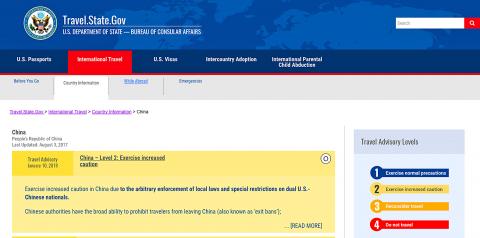The US Department of State’s Bureau of Consular Affairs has removed the flags of all countries from its Web site amid rising suspicion over the solidity of Taiwan-US ties following the disappearance of the Republic of China (ROC) flag from several US government Web sites.
The change was first reported yesterday by the Chinese-language Liberty Times (sister newspaper of the Taipei Times), which said the introductory pages for all the nations listed under the site’s “Country Information” page no longer contain their respective national flags, including the page for China.
The change came only three days after it was discovered that the bureau’s site and that of the Office of the US Trade Representative removed the ROC flag without an explanation, prompting concern over a potential policy shift by US President Donald Trump’s administration.

Screengrab from the Web site of the US Department of State’s Bureau of Consular Affairs
The Ministry of Foreign Affairs on Wednesday issued an unusually strong statement directed at one of its most important strategic partners over the disappearance, saying the removal was “unthinkable, unacceptable and disappointing.”
The ministry also expressed worry that the move would negatively affect how Taiwanese perceive Taiwan-US relations.
“Regarding the Bureau of Consular Affairs’ update of its official Web site and removal of all national flags, our Taipei Economic and Cultural Representative Office in the US has reported the change back to the government,” ministry spokesman Andrew Lee (李憲章) said in a statement yesterday.
The government has always valued its ties with the US and considers it to be its most significant ally, Lee said.
Taipei also appreciates Washington’s long-term support for the nation’s participation in international events, improvement of its national defense capabilities and maintenance of peace and stability in the East Asia region, Lee said.
However, it remains to be seen whether the change on the bureau’s Web site will be comprehensive and whether it was designed to assuage a brewing diplomatic crisis between Taiwan and the US.
As of press time last night, the ROC flag was still the only national flag missing on the Web sites of the Office of the US Trade Representative and the US Department of State, which was the first US government agency to remove the flag, in September last year.

Eight restaurants in Taiwan yesterday secured a one-star rating from the Michelin Guide Taiwan for the first time, while three one-star restaurants from last year’s edition were promoted to two stars. Forty-three restaurants were awarded one star this year, including 34 in Taipei, five in Taichung and four in Kaohsiung. Hosu (好嶼), Chuan Ya (川雅), Sushi Kajin (鮨嘉仁), aMaze (心宴), La Vie by Thomas Buhner, Yuan Yi (元一) and Frassi in Taipei and Front House (方蒔) in Kaohsiung received a one-star rating for the first time. Hosu is known for innovative Taiwanese dishes, while Chuan Ya serves Sichuan cuisine and aMaze specializes

STATS: Taiwan’s average life expectancy of 80.77 years was lower than that of Japan, Singapore and South Korea, but higher than in China, Malaysia and Indonesia Taiwan’s average life expectancy last year increased to 80.77 years, but was still not back to its pre-COVID-19 pandemic peak of 81.32 years in 2020, the Ministry of the Interior said yesterday. The average life expectancy last year increased the 0.54 years from 2023, the ministry said in a statement. For men and women, the average life expectancy last year was 77.42 years and 84.30 years respectively, up 0.48 years and 0.56 years from the previous year. Taiwan’s average life expectancy peaked at 81.32 years in 2020, as the nation was relatively unaffected by the pandemic that year. The metric

Taiwan High Speed Rail Corp. (THSRC) plans to ease strained capacity during peak hours by introducing new fare rules restricting passengers traveling without reserved seats in 2026, company Chairman Shih Che (史哲) said Wednesday. THSRC needs to tackle its capacity issue because there have been several occasions where passengers holding tickets with reserved seats did not make it onto their train in stations packed with individuals traveling without a reserved seat, Shih told reporters in a joint interview in Taipei. Non-reserved seats allow travelers maximum flexibility, but it has led to issues relating to quality of service and safety concerns, especially during

A magnitude 5.1 earthquake struck Chiayi County at 4:37pm today, the Central Weather Administration (CWA) said. The hypocenter was 36.3km southeast of Chiayi County Hall at a depth of 10.4km, CWA data showed. There were no immediate reports of damage resulting from the quake. The intensity of the quake, which gauges the actual effect of a seismic event, measured 4 in Chiayi County, Tainan and Kaohsiung on Taiwan's seven-tier intensity scale, the data showed. The quake had an intensity of 3 in Chiayi City and Yunlin County, while it was measured as 2 in Pingtung, Taitung, Hualien, Changhua, Nantou and Penghu counties, the data